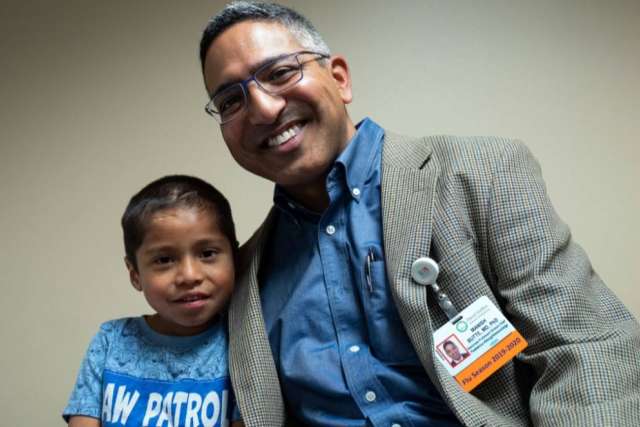Photo: Dr. Manish J. Butte visits with Abraham, who was the first case of a child with disseminated coccidioidomycosis to be cured with a cocktail of drugs to “retune” his immune system. Dr. Butte published a paper about the case in the New England Journal of Medicine. (Photo by Nick Carranza/UCLA Health)
In both immunology and infectious diseases, UCLA Health is at the forefront of understanding both rare and common diseases and how they affect children. Two examples include the fungal infection known as Valley fever and the novel coronavirus driving the COVID-19 pandemic.
Each year, approximately 20,000 people in California report infection with Coccidioides fungi, which reside in the soils of a geographic swath that stretches from the American Southwest — particularly California, Arizona and West Texas — to Mexico, Central and South America. In most cases, infected individuals are asymptomatic or experience a minor respiratory illness commonly known as Valley fever. The vast majority of these patients get better on their own or respond well to antifungal medications, but in about 1% of cases, the infections progress to disseminated coccidioidomycosis, spreading rapidly throughout the body and leading to bone and tissue damage, and in many cases death. The difficulty has been determining which patients are at risk for severe disease.
“Everyone in the endemic areas is susceptible to this infection, but we have had almost no ability to predict who will develop disseminated disease and we have lacked an understanding of what part of their immune response fails to control the infection,” says Manish J. Butte, MD, PhD, E. Richard Stiehm Professor of Pediatric Immunology, Allergy and Rheumatology at the David Geffen School of Medicine at UCLA. “It’s the same with COVID, malaria, tuberculosis and many other infections — some people can clear it themselves with minimal or no symptoms, and others get very sick and die.”
Spearheading research
Dr. Butte has led a team that is making significant headway toward a better understanding of what goes awry in the immune response of some individuals infected with Coccidioides fungi, the genes that control that response and how these patients can be treated. The implications could extend well beyond Valley fever — potentially identifying a new paradigm for treating severe fungal infections endemic to other regions.
The first major clinical breakthrough came in 2020, when Dr. Butte and his colleagues published a paper in the New England Journal of Medicine about the first case in which a 4-year-old boy with disseminated coccidioidomycosis was cured with a cocktail of drugs to “retune” his immune system so that it could fight the infection.
Spearheading a coalition that has included researchers from UCLA, UC San Francisco and UC San Diego, Dr. Butte has since received funding from the UC Office of the President and the National Institutes of Health to probe the differential immune responses to the fungal infection and the genetics behind them, as well as pursuing treatment strategies. They have learned that in about one-quarter of patients with disseminated coccidioidomycosis, the immune system adopts a dysregulated program — called type 2 immunity — leading to spread.
Most recently, Dr. Butte’s coalition was awarded a five-year, $8.4 million grant from the National Institute of Allergy and Infectious Diseases to study genetic risk factors and immune responses to Valley fever.

Meanwhile, Dr. Butte has given talks domestically and internationally about his team’s experience with Valley fever and its potential applications for other endemic fungal infections.
COVID-19 immunization
On the COVID-19 front, a major challenge for pediatricians has been to encourage vaccine-hesitant parents to immunize their children, as well as to educate pregnant women about the importance of getting vaccinated, notes Grace Aldrovandi, MD, chief of the Division of Infectious Diseases in the UCLA Department of Pediatrics, which has been a leader in efforts to better understand COVID-19 in both children and pregnant women.
For pregnant women, “the data are crystal clear that you are at higher risk for having adverse effects from a COVID infection, including both preterm birth and morbidity and mortality in the mother,” Dr. Aldrovandi says. “And, so, if you get immunized when you’re pregnant, you’re ensuring your own health as well as your baby’s health, because we know that the antibodies you generate from the vaccine will transfer to the baby through the placenta and through breastfeeding.”

Despite federal guidance that everyone 6 months and older be vaccinated against COVID-19 and that children 5 and older receive boosters when eligible, a relatively small percentage of young children have been immunized, Dr. Aldrovandi says.
“While it is true that this is generally a milder disease in children than in adults, we do have many children being hospitalized and who are dying,” she notes. “And as pediatricians are well aware, children are often the vectors of infectious diseases to their grandparents and other family members who may be immunocompromised, so we not only need to encourage vaccination, but also testing prior to visiting these family members, as well as the wearing of masks.”
Learn more about immunology care at UCLA Health.
Dan Gordon is the author of this article.





